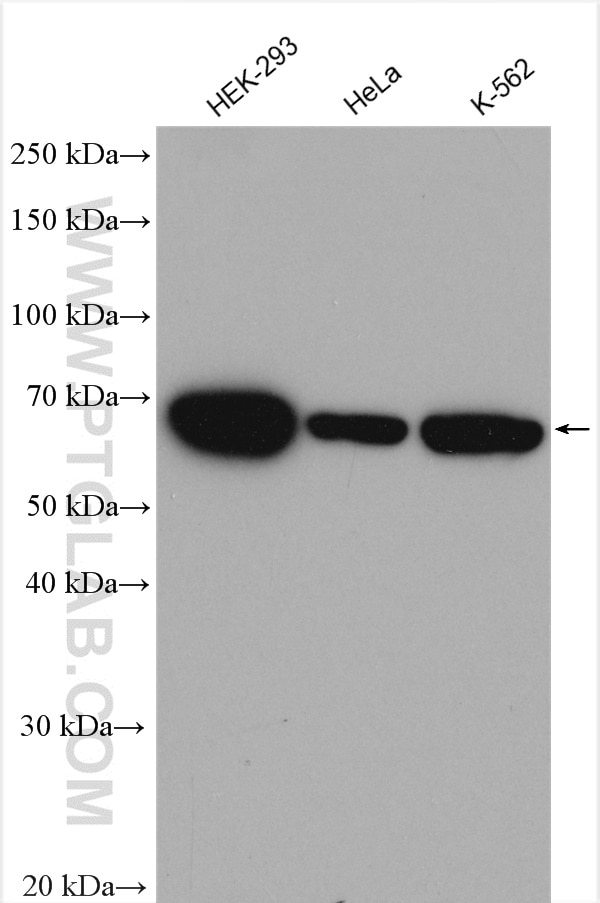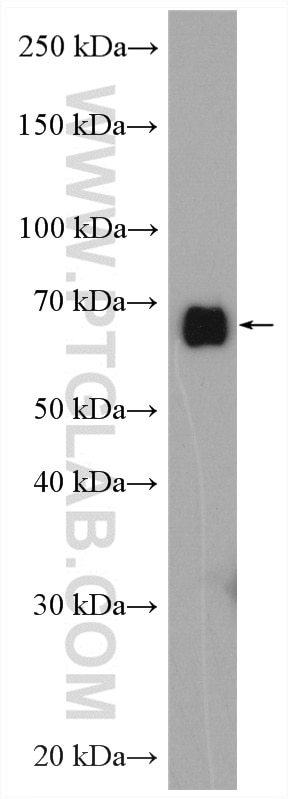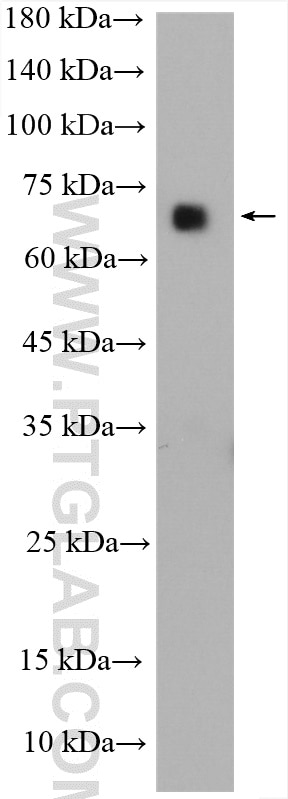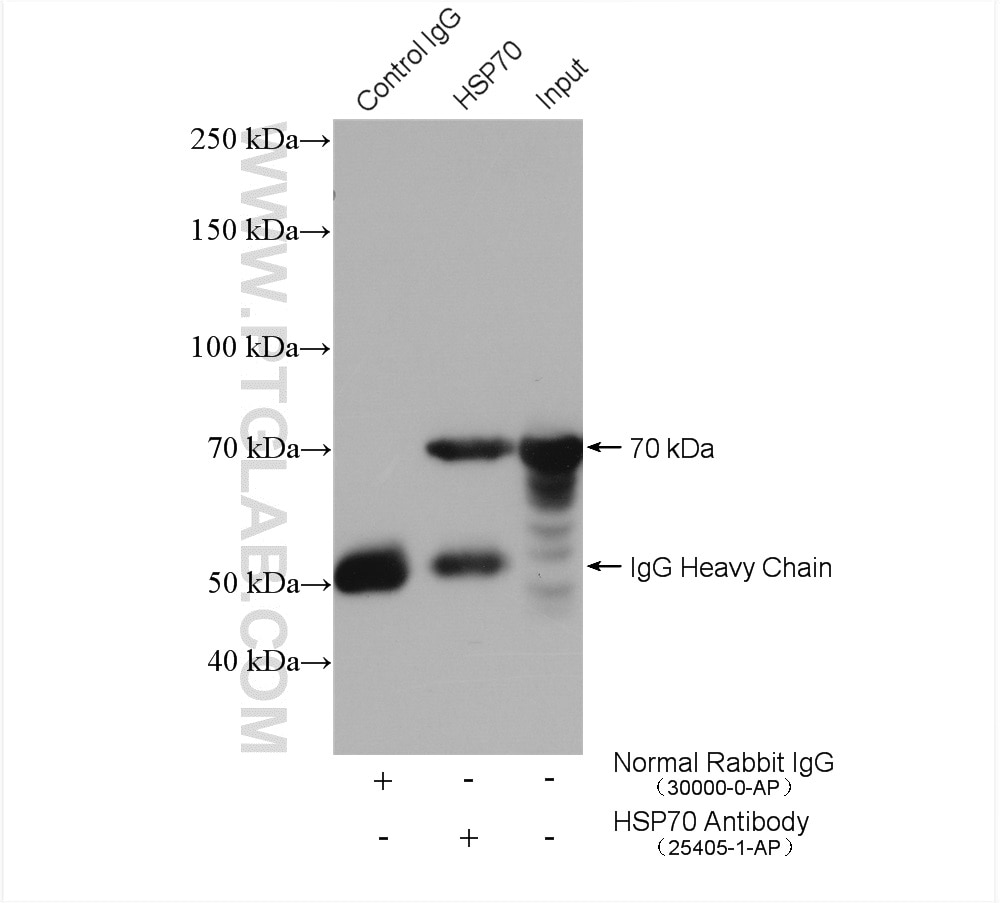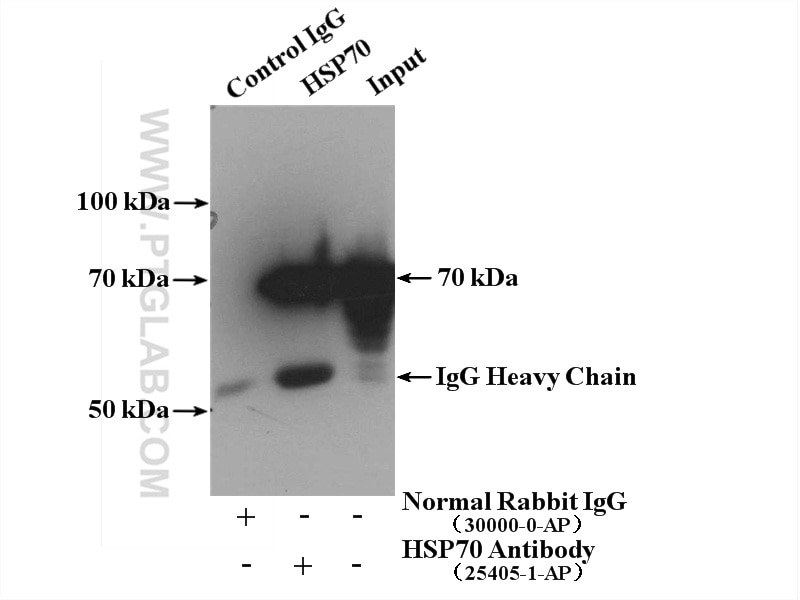Anticorps Polyclonal de lapin anti-HSP70
HSP70 Polyclonal Antibody for IP, WB, ELISA
Hôte / Isotype
Lapin / IgG
Réactivité testée
Humain, rat, souris
Applications
WB, IP, IF, ELISA
Conjugaison
Non conjugué
N° de cat : 25405-1-AP
Synonymes
Galerie de données de validation
Applications testées
| Résultats positifs en WB | cellules HEK-293, cellules HeLa, cellules K-562, tissu cérébral de rat, tissu cérébral de souris |
| Résultats positifs en IP | cellules HEK-293, cellules K-562 |
Dilution recommandée
| Application | Dilution |
|---|---|
| Western Blot (WB) | WB : 1:2000-1:50000 |
| Immunoprécipitation (IP) | IP : 0.5-4.0 ug for 1.0-3.0 mg of total protein lysate |
| It is recommended that this reagent should be titrated in each testing system to obtain optimal results. | |
| Sample-dependent, check data in validation data gallery | |
Applications publiées
| WB | See 6 publications below |
| IF | See 1 publications below |
Informations sur le produit
25405-1-AP cible HSP70 dans les applications de WB, IP, IF, ELISA et montre une réactivité avec des échantillons Humain, rat, souris
| Réactivité | Humain, rat, souris |
| Réactivité citée | Humain, souris |
| Hôte / Isotype | Lapin / IgG |
| Clonalité | Polyclonal |
| Type | Anticorps |
| Immunogène | HSP70 Protéine recombinante Ag13700 |
| Nom complet | heat shock 70kDa protein 1B |
| Masse moléculaire calculée | 70 kDa |
| Poids moléculaire observé | 60-70 kDa |
| Numéro d’acquisition GenBank | BC057397 |
| Symbole du gène | HSPA1B |
| Identification du gène (NCBI) | 3304 |
| Conjugaison | Non conjugué |
| Forme | Liquide |
| Méthode de purification | Purification par affinité contre l'antigène |
| Tampon de stockage | PBS avec azoture de sodium à 0,02 % et glycérol à 50 % pH 7,3 |
| Conditions de stockage | Stocker à -20°C. Stable pendant un an après l'expédition. L'aliquotage n'est pas nécessaire pour le stockage à -20oC Les 20ul contiennent 0,1% de BSA. |
Informations générales
1. What is Hsp70/HSP1A?
HSP1A is a member of the Hsp70 (heat shock protein 70) proteins that act as molecular chaperones ensuring correct protein folding and preventing protein aggregation. Hsp70 protein production is greatly induced by various stress stimuli, including high temperature and toxins. Its expression is often elevated in various cancers.
2. FAQs for Hsp70
a. I cannot detect Hsp70 by western blotting
HSP70s are typically expressed at low levels under normal physiological conditions but are dramatically up-regulated in response to cellular stress. Try to always include cell lysate from cells subjected to stress conditions as a positive control.
a. What loading control can I use for cellular stress experiments with Hsp70?
Choosing a loading control antibody is an important step in western blotting experimental setup. We highly recommend using more than one loading control while developing new cellular stress assays to ensure that a given treatment does not alter expression of house-keeping genes. Hsp70 has a molecular size of 70 kDa, so we recommend using GAPDH (36 kDa), actin (42 kDa), or tubulin (50-55 kDa). More information on our control antibodies can be found here: https://www.ptglab.com/news/blog/loading-control-antibodies-for-western-blotting/.
Protocole
| Product Specific Protocols | |
|---|---|
| WB protocol for HSP70 antibody 25405-1-AP | Download protocol |
| IP protocol for HSP70 antibody 25405-1-AP | Download protocol |
| Standard Protocols | |
|---|---|
| Click here to view our Standard Protocols |
Publications
| Species | Application | Title |
|---|---|---|
Nat Commun Feedback inhibition of cAMP effector signaling by a chaperone-assisted ubiquitin system. | ||
Hum Mol Genet Loss of Ten-Eleven Translocation 2 induces cardiac hypertrophy and fibrosis through modulating ERK signaling pathway. | ||
Oncotarget Quantitative proteomics reveals molecular mechanism of gamabufotalin and its potential inhibition on Hsp90 in lung cancer. | ||
Front Biosci (Landmark Ed) Exosomal miR-22-3p from Mesenchymal Stem Cells Inhibits the Epithelial-Mesenchymal Transition (EMT) of Melanoma Cells by Regulating LGALS1 | ||
Cancer Gene Ther Loss of exosomal miR-200b-3p from hypoxia cancer-associated fibroblasts promotes tumorigenesis and reduces sensitivity to 5-Flourouracil in colorectal cancer via upregulation of ZEB1 and E2F3 |
